|
marketing agency of the month
A new generation builds on firm's legacy
Revenues more than triple in a decade at this Tulsa agency
By Dennis H. Pillsbury
When new owners took ownership in 1998 of The Holmes Organisation, an independent agency based in Tulsa, Oklahoma, the firm had 32 employees and $3.2 million in revenue. Ten years later that picture had changed dramatically, with 60 employees handling more than $10 million in revenue.
What changed? A new infusion of ideas—all courtesy of a third generation of insurance talent.
Jeff Holmes and Stuart DeSelms had worked at the firm with Jeff’s father, Burt Holmes, since joining the agency in 1979 and 1987, respectively. (Burt continues to work at the agency along with his partner, Kent Bogart, providing an invaluable sounding board on key issues.) When Jeff and Stuart were given an opportunity to purchase a small ownership interest in 1990, they began to infuse their own perspective into the agency’s operations.
In 1997 they were offered the chance to buy the firm rather than let the agency be sold to one of the interested national players. Stuart had a lifelong friend in the banking business, whom he approached to finance the buy-out. Bill Grant not only liked the deal from a banking perspective but liked it well enough to leave the bank and join the company as president. In January 1998, Jeff, Stuart and Bill assumed ownership of the agency and began realizing their vision for the future. It’s a vision that has continued to grow and change.
Working smarter
One of the first things they did was to challenge employees to work smarter. “We had a strong core of hungry professionals who wanted the agency to succeed and prosper,” Bill says. “They were here at all hours of the day, including weekends. It was great they were willing to do that, but we didn’t see it being beneficial in the long term. We didn’t want our people to have to make a choice between the agency and their family. That would only lead to poor morale and the possible loss of some key people. Family support is an important part of anyone’s success.
“We recognized there were steps we could take that would eliminate the need to work weekends most of the time,” Bill adds. “Of course, if a claim occurs, then all bets are off. But most times, if we’re working more efficiently, we should be spending our weekends at home with our families.”
A key to making the firm operate more efficiently—and in cutting out most weekend work—was investment in an automated processing system. Because implementing this way of doing business comes with a steep learning curve, Jeff says they tried to reduce employees’ stress any way they could.
“We hired a massage therapist in the interim, which was incredibly well received by employees,” he says. “From there we tackled the root cause of the processing problems and implemented a variety of tools such as being a very early adopter of paperless work flow, which certainly puts consistency in the workflow and greatly reduces errors.”
This had far-reaching results—in many areas. “Because the massage therapist was so well received, we eventually installed a separate relaxation room when we relocated our offices,” says Jeff. “This has now expanded far beyond our original goal and recently led us to hire a full-time wellness coordinator who is in charge of wellness initiatives for our firm as well as our customers.
“The wellness offering has provided us with loss control for employee benefits that we were struggling to capture in a similar way to our property and casualty loss control influence,” Jeff continues. “It has been extremely well received by our clients because we aren’t just providing the service in name only; we have talented people driving the necessary changes.”
Finally, Bill points to another step that helped free up people. “We had built our reputation on providing strong risk management advice to our clients. We decided to focus on that effort to really differentiate us from the competition. But that only made sense if we concentrated on clients who provided us with enough revenue to justify the high level of service.
“We brought in MarshBerry to help us develop a laser-like focus, and they also helped us decide if we should sell off any business or find a different way to service it. Their analysis convinced us that the smaller accounts would always be a distraction, so we sold a lot of our small business accounts to our competitors. Our sales group now only focuses on larger accounts where we are truly able to add value and earn our income,” Bill says.
Focus on expertise
Stuart points out that this strategic decision helped the firm identify its focus and become even better at managing clients’ risks. “We became convinced that what we knew from competing with sophisticated brokers and handling our risk management clients could be adopted in the middle market arena; that it would be a very powerful offering for those who don’t have a risk management budget but share their problems. We are a single corporation with the ability to invest in ideas that can be implemented companywide, as opposed to silo-type agencies that have no common ownership and don’t necessarily invest in clients over the long haul. We take a long-term approach that allows us to introduce a great deal more service from real specialists.
“As far as the risk management clients go, we soon realized that our advantage was our size and local presence,” Stuart continues. “We know and understand complex underwriting, and we know the underwriters that can perform in this sector. If we could perform as well or better than the larger brokers, we were going to get a large percentage of the local business. But that meant we had to become experts in those areas where we intended to compete.”
And that’s exactly what The Holmes Organisation did. Jeff points out that the agency has always had a large oil and gas practice, and a number of agency staff have developed an expertise in that arena. “It made sense for us to build on that model and bring in people who had expertise or interest in a particular niche. For example, we have a young producer who has an affinity for health care. He’s learned about the home health care and allied medical market and has become one of the area’s experts. That has developed into an important niche for the agency.
“We also formed a waste division. That’s an area that continues to grow and offers great opportunity for managing risks that include environmental concerns. We’ve learned a lot more about landfills than we ever imagined,” Jeff says with a laugh.
“We’ve also become very good at bringing in people from other industries who have a sales orientation and teaching them about insurance,” adds Bill. “We have specialists in-house who can support them when coverage questions arise or there are needs for sophisticated risk management solutions. The important thing is that they can speak the language of the people in the niche industry in which they specialize.”
Bill continues: “We have developed a strong banking and financial institution practice. My own experience in banking has been enhanced by the addition of a younger employee we ‘rescued’ from the banking industry. Basically, we look for individuals who are hungry, intelligent and honest. We’ve hired people from the trucking business, from retail printing and even hired the most successful coffee salesman in the area.”
Stuart points out that the firm’s knowledge does not just come from producers understanding the business niches. “We’ve also committed resources to bringing in people who know the ins and outs of coverages that clients in those niches will need. The strongest property insurance specialist in the state is now on our staff. We were continually going to our wholesalers for unique property expertise, and they were excellent at responding and we continue to use them. But the fact that we were going to them so often made it clear we needed the in-house expertise rather than solely relying on others and adding unnecessary commission costs.
“We also have very strong individuals in the D&O and environmental fields,” Stuart continues. “Clearly, environmental expertise was something we needed in dealing with the oil and gas field, but we have parlayed that expertise by going into waste management.”
Beyond insurance
The increased emphasis on risk management has resulted in an agency that no longer views itself as a purveyor of insurance. “Insurance is only one of many solutions to the risk transfer problems that face our clients,” Bill notes. “We want our clients to see us as professionals who help them manage risk, not as insurance salespeople. That has been a philosophy that goes back to the first generation that started this agency. It’s not a new idea, but we have really started to focus on that and are now even willing to walk away from business that doesn’t want to work with us to improve their risk profile.
“That approach is a little scary for us, but we know it will work in the long run and create a stronger agency,” Bill continues. “We’ve also had the efficacy of that approach validated by Scott Addis, who runs workshops called ‘Beyond Insurance,’ that are based on his own, very successful agency experience. He doesn’t just talk the talk; his numbers are evidence that his philosophy works.
“Our goal is to provide value in everything we do—from cost-effective solutions, and knowledgeable staff to exceptional customer service. That allows our clients do their jobs better,” Bill states.
With that goal in mind, while The Holmes Organisation’s insurance company partners are very important, the firm will also work with clients to find different ways to manage risk if insurance cannot provide an effective solution. “At the end of 2007, we formed a medical malpractice captive for a group of physicians,” explains Jeff.
“We also have helped clients take advantage of self-insurance opportunities where their risk profile justifies such action. These areas really allow us to shine. Our clients see that our goals mesh with theirs—to reduce the cost of risk. It’s very compelling when we tell a client that we intend to make a lot less money by teaching them how to self-insure. This involves a long-term commitment by both parties but virtually assures we will have that client for life.”
The agency owners continue to look to the future to decide what expertise and services will best meet their clients’ needs. “We have recently moved into the subrogation business as an extension of claims management,” says Stuart. “But is that enough? Should we have an attorney on staff? Questions like this and changes in services and operation come mostly from staff who are on the front line, dealing with customers every day. Many of our new cutting-edge ideas are driven by our sophisticated risk management departments also.”
Committed to the community
The Holmes Organisation is well known in the Tulsa area, which still accounts for about 80% of its business. But the agency is also known for its employees’ involvement in nonprofit efforts that support the Tulsa community. For instance, Bill recently served as the city’s United Way campaign chairman. Under his leadership, the organization raised $24,001,223, far outstripping many larger cities and placing the Tulsa Area United Way among the top 10 in per capita giving. (By the way, Bill’s daughter’s birthday is December 23, which explains the last four digits in that amount raised.)
“We support the community,” Bill says, “and the community returns the favor.”
The Holmes Organisation represents the future of the independent agency business, providing professional risk transfer expertise to clients and developing a relationship that is based on mutual trust. Rough Notes is proud to recognize The Holmes Organisation as our Marketing Agency of the Month. |
|
| |
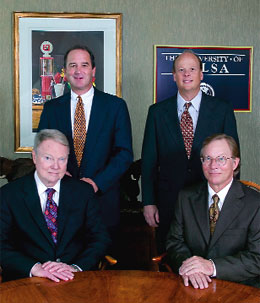 |
| |
Agency principals are (seated from left) Burt B. Holmes, Owner and Jeff Holmes, Owner; and standing (from left) are William A. Grant III, President and Stuart DeSelms, CEO. |
| |
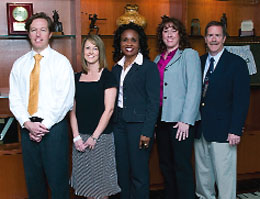 |
| |
The Holmes Organisation team includes: (top photo, from left) Eric Moon, Wellness Coordinator; Brigette Burgess, Account Manager; Ann-Marie Constable, MBA, CFO; Adria Taylor, Personal Lines Manager; Dave Grimmer, COO; (bottom photo, seated from left) Sue Barnes, Claims Manager and Thesha Bellendir, Account Executive; (standing from left) Jennifer Miller, Account Executive; Barbara Armijo, Risk Architect; and Linda Buchholz, Account Executive. |
| |
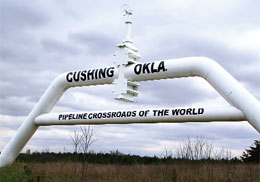 |
| |
A large niche of The Holmes Organisation is energy, covering clients such as this one in Cushing, Oklahoma. |
| |
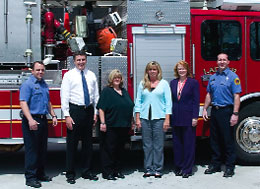 |
| |
| Another agency client is the city of Tulsa, covering a wide range of services including the city fire department. Firefighters flank agency account specialists, (from left), Mike Ziegenhorn, Risk Architect; Kelly Thurber, Senior Customer Service Representative; Gail Harris, Account Executive; and Dee Sink, Risk Architect. |
| |
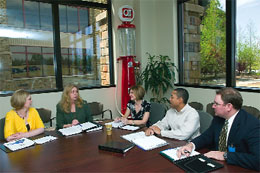 |
| |
Agency personnel make a client visit to the offices of QuikTrip, a Tulsa-based convenience store chain. From left: Cara Mohler, The Holmes Organisation Senior Customer Service Representative; Jo Dye, QuikTrip HR Risk Generalist; Diane Kern, CIC, The Holmes Organisation Account Executive; Walter Smith, QuikTrip Benefits & Casualty Claims Manager; and Danny Edwards, The Holmes Organisation Risk Architect. |
| |
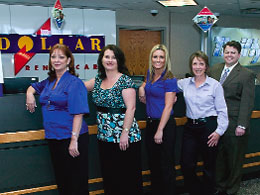 |
| |
From left, Janet Jenkins, Account Executive; Cathy Heiliger, Account Executive; Brandy Cooper, Senior Customer Service Representative; Melissa Raimond, Account Executive; and Brook Boswell, Risk Architect visit another agency client. |
| |
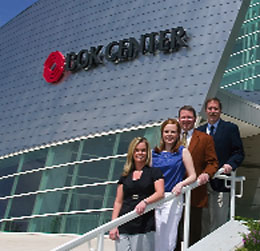 |
| |
Another client, the BOK Center, is host to a variety of musical and sports attractions. Visiting the center are (from left) Staci Naugle, Account Executive; Julie Rohman, Senior Customer Service Representative; Randy Pierce, Risk Architect; and Dave Grimmer. |
| |
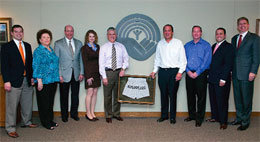 |
| |
| Helping in the recent United Way campaign are, from left, T.J. Swain, Systems Analyst; Helen Rosson, Receptionist; Jim Youell, Risk Architect; Brandy Burkhardt, Accountant; Mark R. Graham, Tulsa Area United Way President/CEO; Bill Grant; Richard Blevins, Risk Architect; Jim Millaway, Risk Architect; and Felix Jones, Risk Architect. |
|